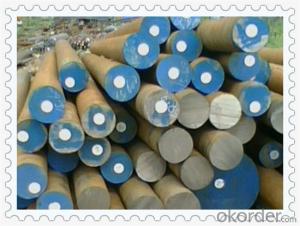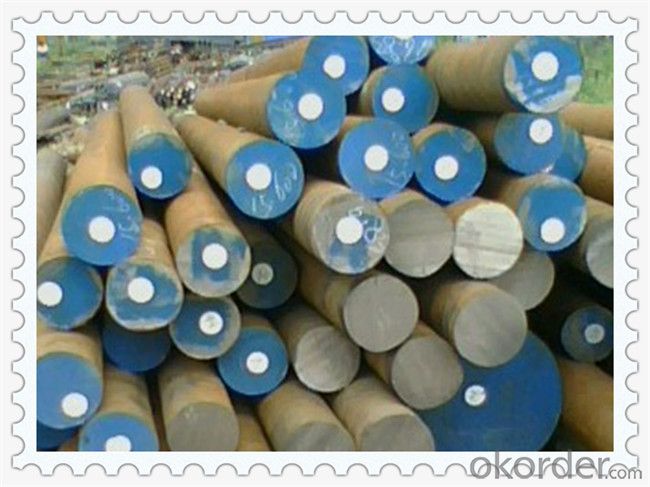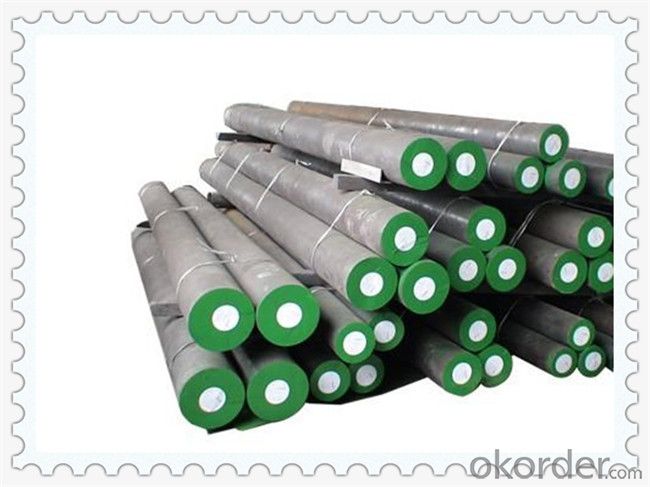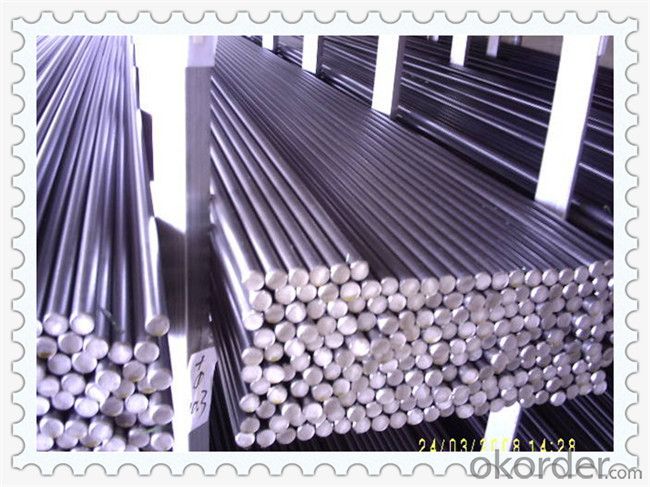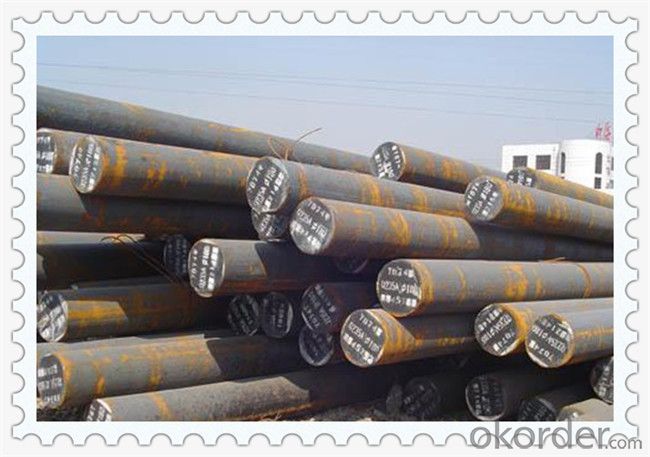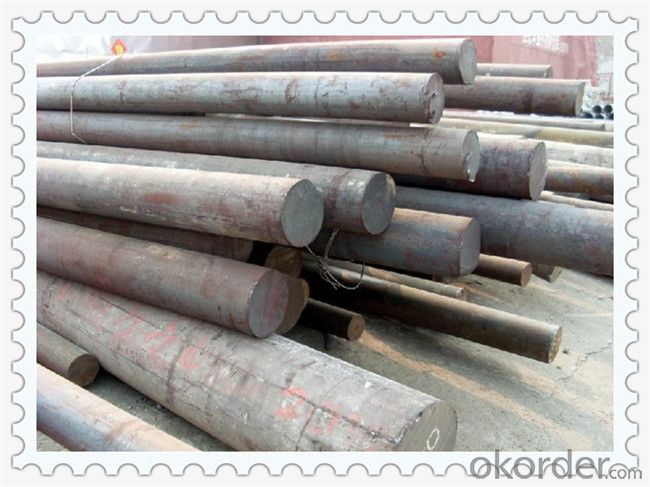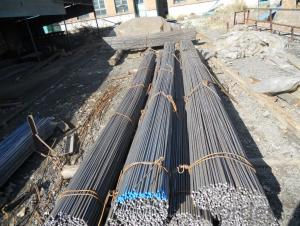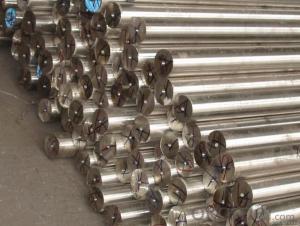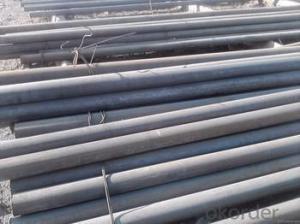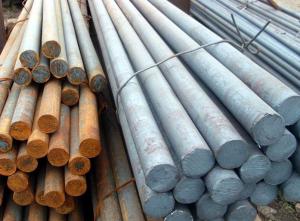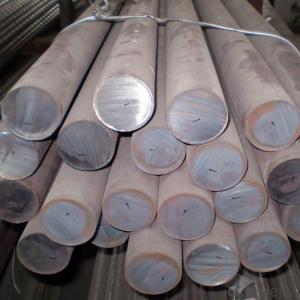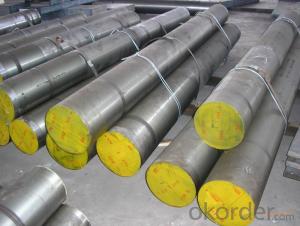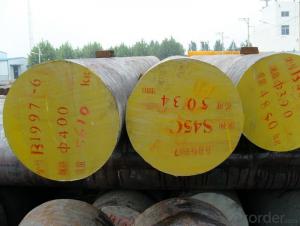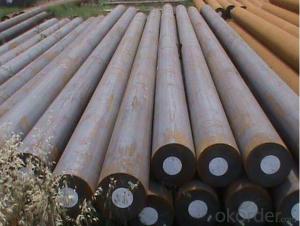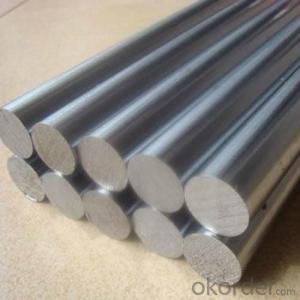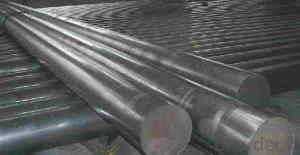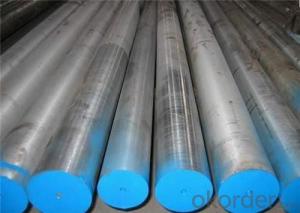SAE 52100 Bearing Steel Round Bars SUJ2
- Loading Port:
- China main port
- Payment Terms:
- TT OR LC
- Min Order Qty:
- 30 m.t.
- Supply Capability:
- 10000 m.t./month
OKorder Service Pledge
OKorder Financial Service
You Might Also Like
SAE 52100 Bearing Steel Round Bars SUJ2
Products Details
ISO9001 certified
Flexible MOQ
Prompt delivery stock within 7days
MTC DIN10204 3.1/3.2
Equivalent Grades
| DIN | AISI | JIS |
| 1.2067 | L1/L3 | SUJ2 |
Composition
| C | Si | Mn | Cr | P | S | Mo | Ni |
| 0.95-1.10 | 0.15-0.35 | 0.25-0.40 | 1.40-1.70 | ≤0.03 | ≤0.03 | --- | --- |
Available Size
| Round steel bar 60-800mm | |||||||||
| Flat steel bar 25-400mm*200-800mm |
Surface Condition
| Black surface/ Grinded/ Machined |
Hardness
| HB225MAX |
Characteristics
Flat Steel GCr15 Flats are of Good hardening ability. Good wear resistance. Shadow depth of hardness |
Applications
Flat Steel GCr15 Flats are for making gauges and measuring tools, mandrels, cold rolls and flanging rolls, wood and paper processing tools, slitting blades, ball bearings and shear knives |
Heat Treatment
| Hardening Harden from a temperature of 790-820oC, 820-860oC followed by water or oil quenching. Hardness after quenching is 63-67, 63-66 HRC. Tempering Tempering temperature: 150-300oC. Hardness after tempering is 56-65 HRC. |
Products Show
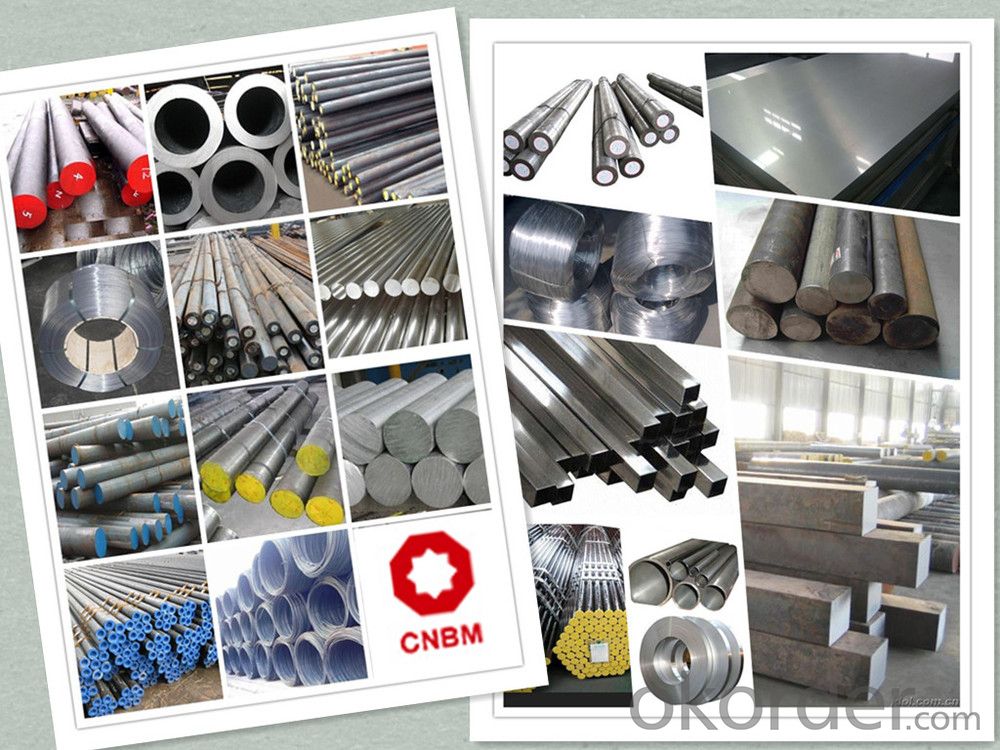
Product Overviews
| Product Name | Typical Grades | Diameter(mm) | Standard adopted |
| Carbon Steel | 20 (1020/S20C/C22) | Ø16-Ø300 |
GB/SAE/JIS/DIN
|
| 40 (1040/S40C/C40) | |||
| 45 (1045/S45C/C45) | |||
| Bearing Steel | GCr9 (51100/SUJ1) | Ø12-Ø250 | |
| GCr15 (52100/SUJ2/100Gr6) | |||
| GCr9SiMn (A485-Gr.1/SUJ3) | |||
Cr-Mo Steel | 20Cr (5120/SCr420H/20Cr4) | Ø12-Ø250 | |
| 40Cr (5140/SCr440/41Cr4) | |||
| 42CrMo(4140/SCM440/42CrMo4) | |||
| Gear Steel | 20CrNiMo | Ø16-Ø600 | |
| 20CrMn(5115/SMnC420/20MnCr5) | |||
| 20CrNiMo(8620/SNCM220/20CrMiMo2) |
Application
| Carbon Steel | Mold bottom, Plastic mold, Construction machinery parts Automobile parts, Security grills, Screens, Construction |
| Bearing Steel | Aerospace, Navigation, Nuclear energy, Chemical industry Electronic information, Petrochemical, Instrument and meter Transportation |
| Cr-Mo Steel | Mechanism & Fasteners gear, Stressed components for vehicles Engines and machines, Parts of larger cross-section |
| Gear Steel | All kinds of gears, Statically and dynamically stressed component for vehicles Engines and machine, Larger cross-section parts, Crankshafts |
Work Shop
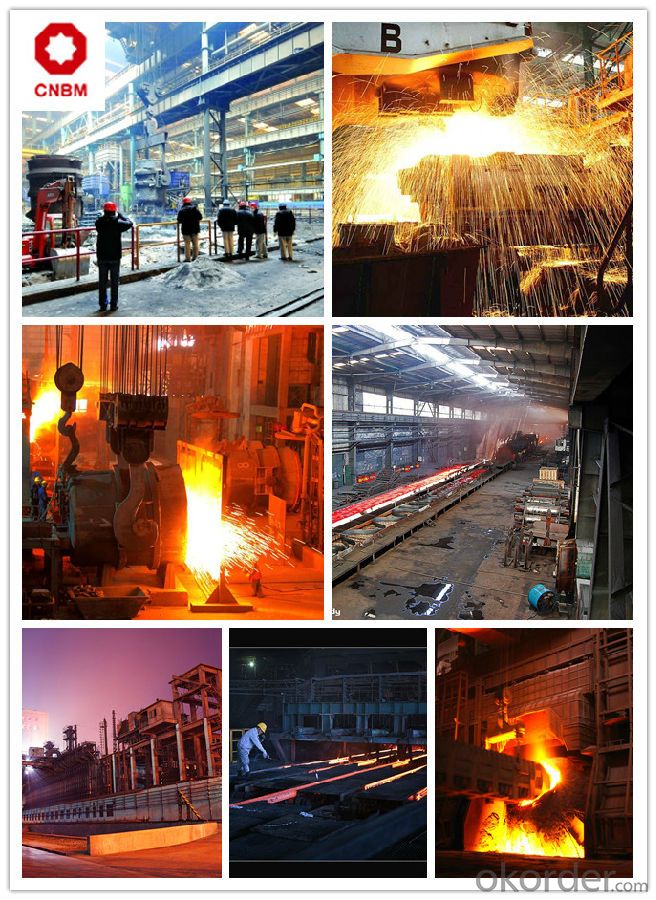
Company Information
CNBM International Corporation is the most important trading platform of CNBM group.
Whith its advantages, CNBM International are mainly concentrate on Cement, Glass, Iron and Steel, Ceramics industries and devotes herself for supplying high qulity series of refractories as well as technical consultancies and logistics solutions.

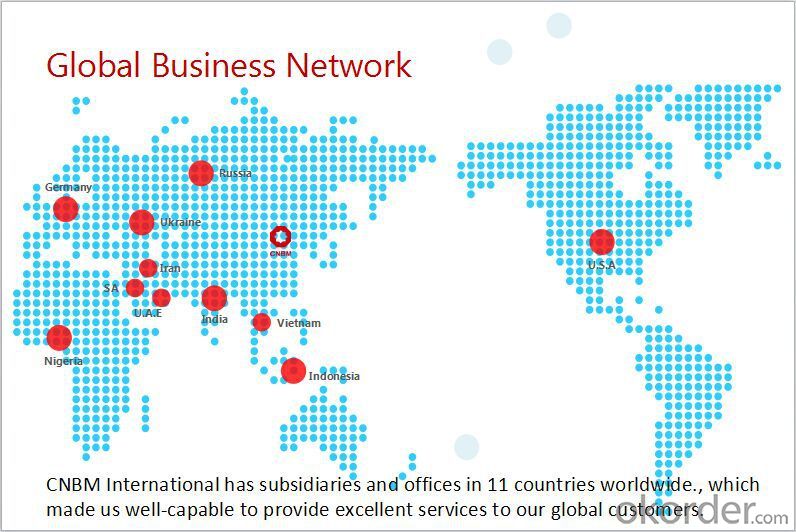
FAQ
1, Your advantages?
professional products inquiry, products knowledge train (for agents), smooth goods delivery, excellent customer solution proposale
2, Test & Certificate?
SGS test is available, customer inspection before shipping is welcome, third party inspection is no problem
3, Factory or Trading Company?
CNBM is a trading company but we have so many protocol factories and CNBM works as a trading department of these factories. Also CNBM is the holding company of many factories.
4, Payment Terms?
30% TT as deposit and 70% before delivery.
Irrevocable L/C at sight.
5, Trading Terms?
EXW, FOB, CIF, FFR, CNF
6, After-sale Service?
CNBM provides the services and support you need for every step of our cooperation. We're the business partner you can trust.
For any problem, please kindly contact us at any your convenient time.
We'll reply you in our first priority within 24 hours.
Packaging & Delivery
1, Packaging: seaworthy package or as required
2, Delivery: 35-45 days or based on quantity
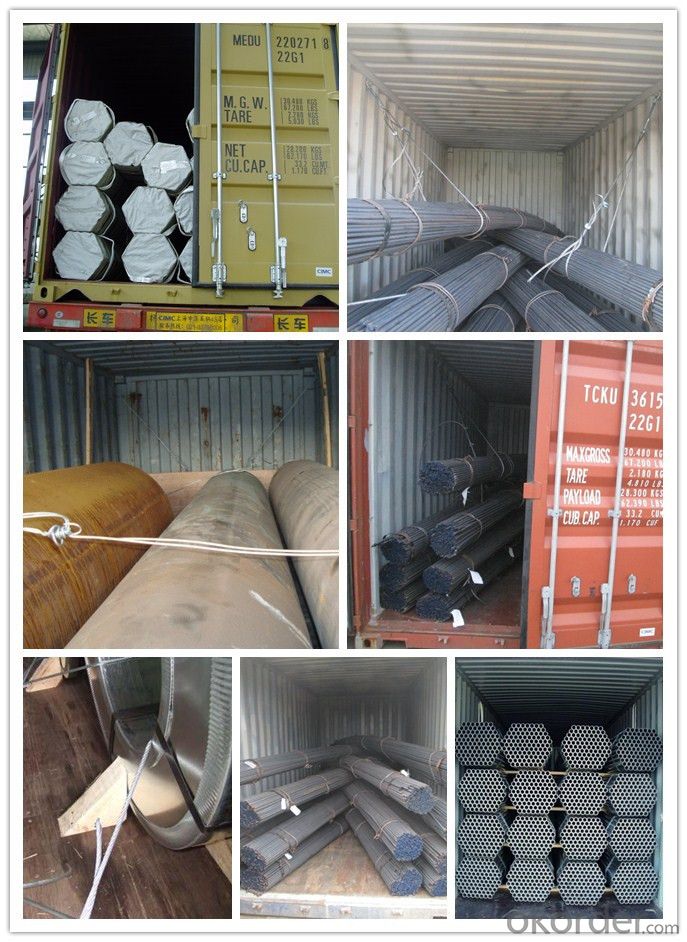
- Q: Are steel round bars available in custom sizes?
- Yes, steel round bars are available in custom sizes. Steel round bars can be manufactured to meet specific size requirements and specifications. Custom sizes can be requested based on the diameter, length, and overall dimensions of the round bar. Whether it is for a specific project or application, many steel manufacturers and suppliers offer the option to customize the size of round bars to suit individual needs.
- Q: What are the different surface defects that can be found in steel round bars?
- Some common surface defects that can be found in steel round bars include scratches, pits, cracks, scale, and decarburization.
- Q: Can steel round bars be threaded?
- Yes, steel round bars can be threaded. Threading refers to the process of cutting threads onto the surface of a cylindrical object, such as a steel round bar, to create a screw-like shape. This allows the bar to be securely fastened into a corresponding threaded hole or to join with another threaded component. Threading can be done using different methods, such as manual threading with a die or using machine tools like lathes or thread rolling machines. The specific method used depends on the size and type of thread required. However, it is important to note that not all steel round bars are suitable for threading, as the material composition and hardness of the steel can affect the threading process. Therefore, it is recommended to consult with a professional or experienced personnel to ensure the steel round bar is suitable for threading and to determine the appropriate threading method.
- Q: What is the difference between a hot rolled and a cold drawn steel round bar?
- Hot rolled and cold drawn steel round bars differ primarily in their production methods and resulting characteristics. Hot rolled bars are created by heating a billet or ingot to high temperatures and shaping it through rolling, resulting in a rough, scaled surface with rounded edges. This process allows for quick and efficient production of larger sizes and quantities, however, the steel is less precise in terms of dimensions and has a lower surface finish quality compared to cold drawn steel. In contrast, cold drawn steel round bars are produced by pulling a hot rolled bar through a die at room temperature, resulting in a smooth, polished surface with tighter dimensional tolerances. This process enhances the mechanical properties of the steel, such as improved strength, hardness, and dimensional accuracy. Cold drawing also provides a better surface finish and closer dimensional control compared to hot rolling. Hot rolled steel round bars are often used in construction, manufacturing, and general fabrication due to their lower cost and ease of production. They are suitable for applications where precision and surface finish are not critical factors. On the other hand, cold drawn steel round bars are commonly used in demanding applications that require superior dimensional accuracy, surface finish, and mechanical properties. They are frequently utilized in automotive, aerospace, and machinery industries, where precision and quality are essential. In conclusion, the main disparities between hot rolled and cold drawn steel round bars lie in their production process, resulting surface finish, dimensional accuracy, and mechanical properties. The choice between the two depends on the specific requirements and applications of the steel.
- Q: What is the maximum length of a steel round bar available?
- The maximum length of a steel round bar available depends on various factors such as the manufacturing capabilities of the steel supplier, transportation limitations, and practical considerations. However, typical maximum lengths range from 20 to 40 feet (6 to 12 meters), but it is always best to consult with a steel supplier to determine the specific lengths they offer.
- Q: How do you calculate the weight of a steel round bar based on its density and dimensions?
- To calculate the weight of a steel round bar, you need to know its density and dimensions. The formula to calculate weight is W = V x D, where W represents weight, V represents volume, and D represents density. First, you need to find the volume of the round bar. The formula to calculate the volume of a cylinder is V = πr^2h, where V represents volume, π is a constant (approximately 3.14159), r represents the radius of the round bar, and h represents the height or length of the round bar. If you have the diameter of the round bar instead of the radius, you can divide the diameter by 2 to find the radius. Once you have the radius, you can substitute it into the formula along with the height of the round bar to calculate the volume. Next, you need to know the density of the steel. The density of steel is typically measured in grams per cubic centimeter (g/cm^3) or kilograms per cubic meter (kg/m^3). Make sure the units of both the density and volume are consistent. If the density is given in g/cm^3, convert the volume from cm^3 to m^3 by dividing it by 1,000,000. Finally, multiply the volume by the density to calculate the weight. If the density is in kg/m^3, the weight will be in kilograms. If the density is in g/cm^3, the weight will be in grams. You can convert the weight to other units by using appropriate conversion factors. Remember to double-check your calculations and ensure that all units are consistent throughout the calculation.
- Q: Can steel round bars be used in the production of telecommunications equipment?
- Yes, steel round bars can be used in the production of telecommunications equipment. Steel is a versatile material that offers strength and durability, making it suitable for various applications, including telecommunications equipment. Steel round bars can be used to create structural components, connectors, brackets, and supports, among other parts required in the production of telecommunications equipment.
- Q: Can steel round bars be used for making storage tanks?
- Yes, steel round bars can be used for making storage tanks. Steel is a strong and durable material that is commonly used in the construction of storage tanks due to its high tensile strength and resistance to corrosion. Steel round bars can be shaped and welded together to form the structure of the tank, providing stability and support. Additionally, steel tanks can be customized to meet specific storage requirements, making them a versatile choice for various industries.
- Q: Can steel round bars be hardened and tempered?
- Yes, it is possible to harden and temper steel round bars. Hardening and tempering are heat treatments that can enhance the hardness and strength of steel. To harden a steel round bar, it must be heated to a high temperature and then rapidly cooled, typically through quenching in water, oil, or air. This procedure alters the steel's structure, resulting in increased hardness and brittleness. However, the hardened steel round bar may be too brittle for many applications. To address this issue and improve its toughness, the hardened steel is subjected to tempering. Tempering entails reheating the steel to a specific temperature and holding it at that temperature for a designated period before allowing it to cool naturally. This process enables the steel to partially soften and alleviate internal stresses, thereby enhancing toughness and ductility. The hardness and tempering temperature can be adjusted to achieve desired mechanical properties for various applications. By employing the hardening and tempering process, steel round bars with different levels of hardness, strength, and toughness can be produced to meet specific engineering requirements.
- Q: How do you prevent warping of steel round bars during machining?
- There are several measures that can be taken to prevent warping of steel round bars during machining. These measures include: 1. Opting for the appropriate steel material with suitable mechanical properties is crucial. Choosing steel with lower carbon content and controlled alloying elements can help decrease the likelihood of warping during machining. 2. Before machining, it is important to conduct a stress relief process such as annealing or normalizing. This helps eliminate internal stresses in the steel round bars, thereby minimizing warping. 3. Utilizing proper machining techniques is essential in preventing warping. This involves using a stable and rigid machine setup, ensuring correct tool geometry and sharpness, and maintaining appropriate cutting speeds and feeds. Monitoring cutting forces and temperatures continuously can also assist in identifying any abnormal conditions that may contribute to warping. 4. Excessive heat generated during machining can cause localized expansion and lead to warping. To prevent this, it is recommended to use coolant or lubricant to dissipate heat and reduce friction between the tool and the workpiece. Sufficient cooling helps maintain a stable temperature and prevents warping. 5. When machining long steel round bars, it is advisable to use appropriate fixtures or supports to prevent excessive deflection or bending. This ensures that the bar remains straight and stable during machining, reducing the chances of warping. 6. Even after machining, stress can still be present in the steel round bars. Performing a post-machining stress relief process, such as tempering or normalization, can further alleviate any residual stresses and minimize the risk of warping. By implementing these measures, the risk of warping during the machining of steel round bars can be significantly reduced. This leads to improved dimensional accuracy and overall quality of the machined parts.
Send your message to us
SAE 52100 Bearing Steel Round Bars SUJ2
- Loading Port:
- China main port
- Payment Terms:
- TT OR LC
- Min Order Qty:
- 30 m.t.
- Supply Capability:
- 10000 m.t./month
OKorder Service Pledge
OKorder Financial Service
Similar products
Hot products
Hot Searches
Related keywords
